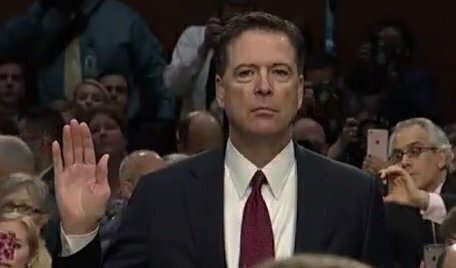Former FBI director James B. Comey appeared before the Senate Select Intelligence Committee for more than two hours on Thursday, and in a throwback to the Watergate era, leaks and tapes were subjects of discussion.
 Comey had released prepared testimony on Wednesday via the Senate’s website and there were multiple questions asked by the Senators about Comey’s recollections of his meetings and calls with Donald Trump. But among the new revelations was Comey’s disclosure that he had leaked details about a conversation with President Trump to a friend at Columbia Law School, to forward to the media.
Comey had released prepared testimony on Wednesday via the Senate’s website and there were multiple questions asked by the Senators about Comey’s recollections of his meetings and calls with Donald Trump. But among the new revelations was Comey’s disclosure that he had leaked details about a conversation with President Trump to a friend at Columbia Law School, to forward to the media.
Senator Susan Collins asked Comey if he had shown his notes about President Trump to anyone outside of the Justice Department. Comey confirmed that he gave a copy of one to a friend who was a Columbia Law School professor after he saw Trump’s twitter message alluding tape recordings of their meetings.
“I woke up in the middle of the night on Monday night because it didn't dawn on me originally, that there might be corroboration for our conversation. There might a tape. My judgment was, ‘I need to get that out into the public square.’ I asked a friend of mine to share the content of the memo with a reporter. I didn't do it myself for a variety of reasons. I asked him to because I thought that might prompt the appointment of a special counsel. I asked a close friend to do it.”
Soon after Comey’s move, a story appeared in the New York Times recounting Comey’s claim that he had been asked to drop an investigation of former National Security Advisor Michael Flynn. The story was quickly followed by the Justice Department’s appointment of Robert Mueller as a Special Counsel to investigate Russian influence on the 2016 presidential campaign.
So far, Mueller hasn’t shared Comey’s memos with the Senate, which is a point of contention. Senator James Lankford then asked Comey if he still had a copy of the memos. Comey said he didn’t but there may have been copies that were sent to the Times via the Columbia Law professor.
“The individual that you told about your memos, that then were sent on to The New York Times, did you have a copy of the memos or told orally?” Lankford asked. Comey said he had a copy at the time, and Lankford then asked if the Times still had them.
“Good question. I think so. I guess I can't say for sure sitting here, but -- I guess I don't know. But I think so,” Comey said.
Lankford then hoped that Comey could ask the Times to return the notes. “Obviously, the notes are really important to us, so we can continue to get to the facts as we see it. The written documents are exceptionally important,” he said.
Comey said he felt he had the legal right to share the information. “As a private citizen, I felt free to share that. I thought it was very important to get it out.” For now, it remains to be seen if the Senate committee will use its subpoena power to get the information from the newspaper or the law professor.
The subject of the alleged tapes also came up more than once during Comey’s testimony. It was the possible existence of the tapes, Comey said, that led him to contact his friend as an intermediary to the media.
“Look, I've seen the tweet about tapes. Lordy, I hope there are tapes,” Comey said. “I hope there are and I will consent to the release of them. . . . The president surely knows whether he taped me, and if he did my feelings aren’t hurt.’’






